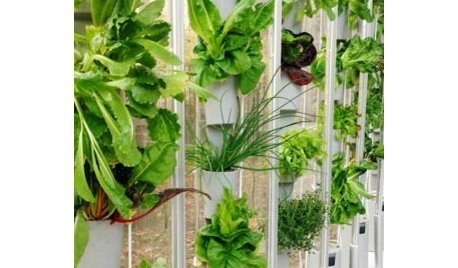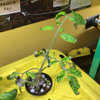100% Organic Hydroponics
Hi All!
Just wondering how many other hydro growers are using 100% organic nutrients.
After a couple years of fine tuning my organic hydro garden has really taken off.
At first, it seemed that organic hydroponics was more trouble and harder but now I am thinking it is quite a bit easier.
I've been having success with using Organic Nutrients Insect Frass 2-2-2 as the base fertilizer. Along with the frass I use Algamic for seaweed, humic acid, calplex, mycos for mycorrhizae and azos as a nitrogen fixing bacteria.
I have been using lemon juice and RO water as ph down and degassed tap water as ph up.
What do you guys use?
Comments (12)
Xevus
12 years agolast modified: 9 years agoThe real question is how do you define "organic" in hydroponics ? Especially since 100% natural fertilizers and nutrients doesn't really work in hydroponics.
joe.jr317
12 years agolast modified: 9 years agoI think you have to define hydroponics, first. I mean, anytime someone offers a history on hydro, they go all the way back to the hanging gardens of Babylon. I guarantee you they were using organic nutes. They were also probably using some dirt, which some people say disqualifies a method from being hydro as today most people think of it as soilless.
Related Professionals
Holly Springs Landscape Architects & Landscape Designers · Deer Park Landscape Architects & Landscape Designers · Lakewood Landscape Architects & Landscape Designers · Goodyear Landscape Contractors · Deerfield Landscape Contractors · Fort Payne Landscape Contractors · Glendale Heights Landscape Contractors · Huntley Landscape Contractors · La Verne Landscape Contractors · North Ridgeville Landscape Contractors · Salem Landscape Contractors · Selden Landscape Contractors · Wallingford Landscape Contractors · Wanaque Landscape Contractors · Clearfield Landscape Contractorshomehydro
12 years agolast modified: 9 years agoDefining "Organic hydroponics" is fairly simple. To achieve certified organic produce/plants, there are 3 elements that need to be met. First (although I think this is just plain silly), any materials used to build the system need to be food grade. Second, only use certified organic hydroponic nutrients, as well as any additives, beneficial microbes or fungi, as well as pH adjusters etc.. Lastly make sure to only use certified organic pesticides/fungicides etc.. Or better yet use beneficial insects instead. Personalty other than using organic pesticides or beneficial insects, I couldn't care less about the term "organic" when growing hydroponically. The food is no better tasting, or even for you because it's deemed organic.
But growing organically is better for the environment when growing in soil. Simply because it replenishes the beneficial microbes in the soil, that keeps the soil healthy and fertile. Rather than just adding fertilizers that lack them, and ultimately depleting beneficial microbes from the soil all together (leaving it un-fertile). But again it's still no better tasting, or for you because organic methods were used.
TheMasterGardener1
12 years agolast modified: 9 years agoGeneral Hydroponics makes an all vegan-organic line called gerneral organics. Check it out.
joe.jr317
12 years agolast modified: 9 years agoGeneral Hydroponics is also one of the loudest when it comes to organics in hydro. They are known for saying it's a bunch of BS hype. In fact, they used to have an article posted on their site about it. It said that the term organics is a matter of "bureaucratic definitions".
HH, there is a lot more to it than that, which is why you don't see certified organic hydro tomatoes in the stores. You might find some organic tomatoes in some states (though I haven't seen it), but that isn't the same as certified organic. Some states allow organic to be on the label even without certification. You just can't label them as certified. Certified is really only for those looking to go into business - and if they are using a forum to get their info, they are not likely to succeed. I think this is about plain old organics and not the multitude of rules you have to abide by and people you have to pay for certified organics. Aside from that, though, I agree with you. In fact, I'll go a step further and say it's better for the environment than organics because the means of harvesting organic nutrients are often much more damaging than the production, use, and disposal of man made hydro nutes. Plus, with hydro, you use considerably less space and (in some systems) water. You also can eliminate the need for many pesticides. That doesn't just mean eliminating a potential poison. It means cutting out the manufacturing process that is extremely taxing on the environment.
homehydro
12 years agolast modified: 9 years agoWell for the most part the term "organic" does have a bunch of "bureaucratic definitions" attached. The best way I can explain it, is that it's similar to the US medical marijuana laws. Each state and county has their own laws and regulations, and the feds have theirs too. But they just cant seem to get together and agree on anything. Agriculture is basically the same thing, only much worse because there are so many different fertilizers, as well as pesticides on the market. And each crop has their own specific fertilizers needs, all with their own federal and local regulations on their legality and/or safe use because of specific local environments. And pesticides, well that's another whole can of worms with the same bureaucratic local and federal laws/regulations.
But with respect to disposing of used nutrient solutions from hydroponics farms, That's another bureaucratic issue, but one I never really consider. I just cant see sending used nutrient solution through the sewer to the sewage treatment plant a problem. Much less certified organic nutrients, in fact all the beneficial microbes in it would probably be a benefit to the sewage treatment plant. However there is no doubt the city and state (probably even the feds) would need to inspect the setup and determine it's safety to the environment. Especially for non recovery type systems that leach into the soil.
But once a fertilizer and/or pesticide has been given a certified organic rating, technically you would still need to check to see if it is legal for use in your area, and will comply with your local "certified organic" regulations (the bureaucratic BS). But I still say growing organic (certified organic) food is as simple as using certified organic nutrients (that adhere to your local laws), using certified organic pesticides (that adhere to your local laws), and even though I think it's silly using food grade materials for anything that come in contact with the nutrient solution, plants and/or roots. But with the now added amendment of disposing of the used nutrient solution in a safe eco-friendly manner that satisfies local laws (even organic regulations if needed).
Is Organic Food Really Worth The Extra Cost
(Quotes)
"the National Organic Program, which regulates the process of growing organic food, is actually a marketing program within the U.S. Department of Agriculture. The government stops short of making any scientific claims that organic food is safer or more nutritious than conventional foods.""Farmers raise organic crops without using chemical pesticides, petroleum-based fertilizers, or sewage sludge-based fertilizers. They operate using the USDA's list of accepted products."
"Strict rules also determine how organic food is labeled. Packaged products made with at least 95 percent organic ingredients can use the USDA organic seal. If a product is made entirely with organic materials it may also be labeled "100 percent organic.""
"Growers or sellers who intentionally mislabel products face fines of up to $11,000 for each offense. But any vendor can tell consumers their farms are in the process of becoming organic, and those claims are unregulated, according to Colleen Lammel-Harmon, spokeswoman for the Illinois Dietetic Association. This often happens at farmers markets. She says if market goers want to be sure they're getting organics, they should ask vendors some questions to tease out whether farmers actually are involved in the process."
The Great Debate: Organic Farming vs. Hydroponics
(Quotes)
"Both organic farming and hydroponic farming embrace a desire to protect our planet's fragile environment. Both methods steer clear of harmful chemical fertilizers and pesticides.""The term "organic" is a versatile term that is widely varied. That little "organic" label on produce is the result of a tangled mass of bureaucratic definitions, which seem to vary from one state to the next. In fact, a product that falls far below one state's organic standards can receive the "gold standard" label of Certified Organic in another. There seems to be little consistency from one state to the next as to what truly constitutes organic produce."
"In order to be considered organic, plants cannot be nourished with mineral salts or any other refined substances, even though these are of a higher purity than most organic fertilizers. Only unrefined minerals can be applied to organic crops."
"Hydroponic growers have completely eliminated the need for soil and its micro-organisms. This has resulted in better crop quality, higher growth rates and much healthier produce, all without soil erosion or water supply contamination. The fertilizers used in hydroponics are much more pure than those utilized in organic growing, and they also leave no residue in cultivated produce. The result is that more people can be fed, less precious natural resources are used, and the produce is much healthier and flavorful."
More Useful links
Organic Certification
Welcome to the National Organic Program
National Organic Standards Board (NOSB)Crops Committee Discussions on Guidance Statements Relative to Soil-less Growing Systems
Oregon State Fertilizer program "stop sales list" (products listed are not legal for sale or distribution in Oregon)Now I know all this relates to "certified Organic" government labeling, and most people are not interested in obtaining a government label for selling what they grow. But when referring to "organically grown" as far as I'm concerned it either falls under the certified organic guidelines, or it dosen't. Without guidelines to fallow the term "organic" is meaningless. In science I believe "organic' is defined as carbon based. That would qualify any plant and/or any produce it grew as organic.
Without referring to specific guidelines, the term organic has a different meaning to everybody. One person may call his garden organic because he dosen't use any pesticides. One person may use organic fertilizers (half the time) and call his garden organic. One person may consider simply growing in soil as organic etc. etc. etc.. Bottom line the term "organic garden" is often used by people thinking their truly growing organically, but without fallowing any guidelines, and simply calling it organic because it falls under their personal definition of organic.
My whole point is if your goal is to grow what is defined as truly organic, and what you would buy at the grocery store with a "certified organic" label. You'll want to fallow the same government guidelines that organic produce farmers fallow to get the rating. But you don't need to actually pay and have the government come in to certify what you grow as organic if your just going to eat it yourself, or give it to friends. But if you want the same thing, fallow the same guidelines. If your not interested in growing what would be considered real certified organic produce, but would just feel better trying to be more eco-friendly. That's fine, it's your garden you can grow however you want. Just remember though, what your definition and guidelines are for what you call organic, isn't going the be the same as someone else.
As I mentioned when it comes to the term "organic" the government guidelines are how I define organic (even though I think it's silly to need to only use food grade plastics). Everything else I don't consider actuality organic. I don't care about growing organically anyhow simply because there is no verifiable benefit in taste, product quality, or even in vitamins and minerals found in organically grown produce. But I do want to use organic pesticides (and/or even better beneficial insects) because it's better on the environment. And even though that might fall under some peoples personal definition of organic, it dosen't satisfy government guidelines, so it dosen't fall under mine.
TheMasterGardener1
12 years agolast modified: 9 years ago^Yes very true. Organic farming large scale also uses much more petrol moving all that compost around.
homehydro
12 years agolast modified: 9 years agoYes, I don't have any figures on how many instances of e-coli and salmonella there have been, and I cant say who got blamed for what. But I do know there is a much higher chance of it using organic fertilizers because of the various types of animal fesies in it. I have even saved a PDF discussing food safety on aquaponic farms called: On-Farm Food Safety: Aquaponics. But that dosen't change the definitions of organic farming, just gives you more issues to be aware of if using them. That dosen't eliminate the chances with refined chemical fertilizers though, animal fesies can still come in contact with any produce being grown regardless of fertilizer used (backyard or commercial farms alike), birds fly over and drop their bombs, field mice, rabbits, squirrels, dear etc. can all come in contact with your produce. Even insects like cockroaches that love to hide in the foliage near the ground are carriers. All the above is why I wash my food very well before I eat it, not because of chemicals from pesticides.
I haven't read the label on NEEM oil all the way through, so I cant say if it is harmful to aquatic life. But anything is harmful in large enough quantities, that's why local laws restrict their use. Even just soap and water is harmful in enough quantity. I have never herd of Rotenone, so I just don't know anything about it. Though I do know there is always someone saying this or that caused my illness, most of the time that's just people trying to sew someone. And as you mentioned even university study's can be subject to trying to appease those funding the study's, that goes for any institution that receives funding.
So the study's linking any product to any health or environmental issues is subject to the same kind of appeasing of the people funding the research that they blame the other side of doing (their not exempt). Personally I would need to closely scrutinies both sides of the argument before taking one side or the other. Most of the time that isn't done by people making either claim. But I can say if there is some creditable truth to them, the government regulations will eventually reflect it. Granted a bit slowly though, but that's because the claims need to be substantiated and scrutinized from both sides by the agency's regulating their use. They cant just take the word of who they like the best.
The only other research being done is privately funded, and done mostly by manufactures Either the ones selling the product in question, or by a manufacture making a negative claim against another one. Just guess how the results will come out? You don't even need to read the study, all you need to know is who conducted it to know witch side of the fence it will be in favor of.
I'm not an advocate (or fanatic) of either side of the great "organic" debate. Fact is, truth be told, I don't really care. And I certainly am not going to go to school to study chemistry just to kill a few aphids. But if I have 2 pesticide products in my hand to choose from that will do the job, and they are about the same price, and one is certified organic and the other is not. I will almost always go with the organic one (unless I'm told it dosen't really work). But if the organic is much more expensive, I'll feel fine using the non-organic pesticide. But none of that changes government guidelines or regulations.
Debating government guidelines or regulations is a whole other topic. Same goes for debating personal definitions of what constitutes "Organic" in the first place. For anyone who wants to go to school and do the university research, find what they think is the better way and debate that with the government agency's that regulate it, all the more power to you. I'll be spending my time growing.
homehydro
12 years agolast modified: 9 years agoPart two,
I guess that is what happens when you click preview and cant see the original post anymore.Yes, I know that even certified organic pesticides (any pesticide) will kill all insects beneficial or destructive. That's why you choose to use one or the other. I never claimed that organic pesticides were safe for beneficial insects. Perhaps some company's are trying to mislead people on that subject, but any pesticide (organic or not will kill both beneficial and harmful insects).
I'm also not one to jump on the resent bandwagon that says theirs a rash of disasters lately (like flooding and/or global warming). These are the same disasters that have been going on sense time began. The only difference is in the last 50 years there has been increase in media coverage, and especially in the last decade. In fact, records have only been recorded for the last 100 years or so at best for some records. 100 years ago there was no media coverage other than a few hand typed papers. It would take years before news of a tsunami in japan ever reached you. Now you know before the wave is even over. That dosen't make the news a global rash or epidemic.
There is no rash of anything going on. At best weird resent weather behavior is easily explained. Every 7 years there is something called el-nino, and it affects ocean currents. This affects weather patterns around the world. Both in el-nino years, as well as non el-nino years. But it is predictable if you keep up with it. That is why we are having cooler weather In AZ. this year than normal (most likely we will also be much wetter come monsoon season too). These ocean currents affect worldwide weather and precipitation patterns. 300 years ago the levees in Louisiana wouldn't have broken. It's not a rash of flooding, they weren't created yet (how could something not created yet break?).
Don't forget that 100 years ago the airplane was only a futuristic model. 50 years later there's a man on the moon. Great strides in technology have been made in just a few decades. The earth has been around for billions of years.There is a rash of technology, not earth patterns.
Even though I believe that human consumption of fossil fuels has led to a rise in greenhouse gasses, I'm not prepared to say that most of the global warming isn't due to regular (or irregular) natural cycles. I don't just jump on the same bandwagon everyone else is jumping on because I need a ride. I need to be convinced before I believe anything.
parkercwn
9 years agolast modified: 9 years agoEveryone has made some good posts!
In my humble opinion the only way to get the highest quality food for you and your family is to either grow it yourself or to buy it from a local farmer conventional or organic.
The reason for this is because when you buy from local farmers at u-picks and farmers markets the fruits and vegetables are grown for ripeness, not for shipment. There is a lot more care taken with them and they are packed with the most nutrients, because they are vine or stem ripe.
Jebediah.Springfield
9 years agolast modified: 9 years agoLots of great information in this thread! I've been a long time hydroponic grower. I've always had the best luck with deep water culture type systems. You cant beat the price and the yields have always been excellent as far as my tomatoes and lettuce have been concerned.
P13 Organics has a product out there that works phenomenally well in hydroponics. I've used it in soil and it works just as well too. It won't clog up or gum up your equipment like the other fertilizers out there.

















joe.jr317